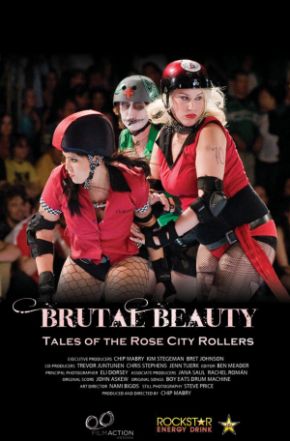★★½
“Too much ego and not enough doughnuts.”
 For the next entry, we leap forward to 2009, and Portland – a city which all we know about, we learned from Portlandia. And, on that basis, of course it’s a city which has roller derby, where it sprung, virtually fully-fledged to four-figure crowds. This is less of a landmark doc, in that it doesn’t cover the beginning, middle or end. It’s basically a year or so in the lives of the participants in the Rose City Rollers, which is the Portland league. It covers both their local season, and then, once that’s over, follows the travelling team, the Wheels of Justice, first as they head down to San Francisco to take on their hated rivals, then over to Denver for the regional championships.
For the next entry, we leap forward to 2009, and Portland – a city which all we know about, we learned from Portlandia. And, on that basis, of course it’s a city which has roller derby, where it sprung, virtually fully-fledged to four-figure crowds. This is less of a landmark doc, in that it doesn’t cover the beginning, middle or end. It’s basically a year or so in the lives of the participants in the Rose City Rollers, which is the Portland league. It covers both their local season, and then, once that’s over, follows the travelling team, the Wheels of Justice, first as they head down to San Francisco to take on their hated rivals, then over to Denver for the regional championships.
S’okay. The problem is there’s very little here any fan of the sport won’t already know about, or have seen before, and not enough to draw in anyone else. Is it heretical to say that roller derby chicks can be stereotypical in their individuality, just as much as those in the mainstream they profess to detest? That is the impression that comes over here, and a couple of the women are… Well, to be honest: really annoying. I guess there’s a certain kind of extroverted type who will be attracted to roller-derby. But simply because you strap on wheels and give yourself a fake name, doesn’t necessarily stop you from being an irritating bi… Well, let’s just say: I don’t care in the slightest what kind of tattoos you get, and move on, shall we? As for “Roller derby saved my soul”, even as a fan of the sport, I reckon that counts as going overboard. What next? “Roller derby cured my tumour”?
It’s a shame, since when concentrating on the sport, the documentary is decent enough. There’s a great explanation of the rules involving donuts [incorporating a plug for the city’s famous Voodoo Doughnut store!], and they also provide a better insight into the separate and largely distinct roles of jammers, pivots and blockers, as well as the different skills needed for each. In contrast to some other leagues, the theatrical fights and things like the punishment wheel are nowhere to be found in Portland. However, it’s not long before we’ve abandoned derby and are back at watching one women yell at another through a bathroom door. As an insight into the appeal of the pastime, it’s a good deal less than satisfactory.
[This one can currently be seen on Hulu without a subscription being needed.]
Dir: Chip Maloy





 Rosa Rubinsky (Baff) is working as a waitress at a wrestling venue, when her swift dispatch of an over-affectionate coworker gets her noticed by a promoter (Bechler). He convinces her to try out, under the watchful eye of Mildred Burke [playing herself – she held the Women’s World Championship for about 20 years], and after some initial shock, discovers she likes the theatrical sport. Despite never having been outside the state of New York, she goes on the road, along with a set of other women wrestlers, and they travel up and down the East coast, putting on shows, though Rosa is still deemed too “green” to get in the ring. That changes after she meets the current women’s champion, Terrible Tommy (O’Brien, another genuine wrestler of the era). A bout for the belt is arranged, in which Rosa – known now as “Rosa Carlo, the Mexican Spitfire” – will take on Tommy for the title.
Rosa Rubinsky (Baff) is working as a waitress at a wrestling venue, when her swift dispatch of an over-affectionate coworker gets her noticed by a promoter (Bechler). He convinces her to try out, under the watchful eye of Mildred Burke [playing herself – she held the Women’s World Championship for about 20 years], and after some initial shock, discovers she likes the theatrical sport. Despite never having been outside the state of New York, she goes on the road, along with a set of other women wrestlers, and they travel up and down the East coast, putting on shows, though Rosa is still deemed too “green” to get in the ring. That changes after she meets the current women’s champion, Terrible Tommy (O’Brien, another genuine wrestler of the era). A bout for the belt is arranged, in which Rosa – known now as “Rosa Carlo, the Mexican Spitfire” – will take on Tommy for the title. If you’ve seen Bollywood films, you might expect the same here – a light, breezy romp, interspersed with gratuitous musical numbers. Wrong, on every conceivable level. It’s an almost unrelentingly grim portrayal of the life of Phoolan Devi (Biswas), sold off by her family at the age of 11, abused by her husband (Shrivastava) as well others in the higher-ranked Thakur caste, and basically treated worse than an animal. She’s eventually abducted by a gang of bandits, whose lieutenant Vikram (Pandey) is sympathetic to her: when the leader tries to rape her, Vikram shoots him in the head, and takes over, making Phoolan his co-chief. However, after the group’s true leader is released from prison, he’s none too happy, and sets out to teach Phoolan a lesson than will make her earlier misfortunes seem like paradise.
If you’ve seen Bollywood films, you might expect the same here – a light, breezy romp, interspersed with gratuitous musical numbers. Wrong, on every conceivable level. It’s an almost unrelentingly grim portrayal of the life of Phoolan Devi (Biswas), sold off by her family at the age of 11, abused by her husband (Shrivastava) as well others in the higher-ranked Thakur caste, and basically treated worse than an animal. She’s eventually abducted by a gang of bandits, whose lieutenant Vikram (Pandey) is sympathetic to her: when the leader tries to rape her, Vikram shoots him in the head, and takes over, making Phoolan his co-chief. However, after the group’s true leader is released from prison, he’s none too happy, and sets out to teach Phoolan a lesson than will make her earlier misfortunes seem like paradise. Wow. This is dreadful, and I speak as someone who enjoyed its predecessor, appreciating its excessive updating of Little Red Riding Hood. Bright tries to capture lightning in a bottle here, this time going for Hansel and Gretel, but it’s largely a miserable failure, imploding in screeching one-note performances from the two leads and far too many scenes of teenage girls vomiting. Yep. Girls vomiting. The scenario has Crystal Van Meter (Lyonne) sentenced to 25 years in prison, by a judge (a cameo by John Landis) fed-up of her petty criminality. There, she meets fellow desperado Angela “Cyclona” Garcia (Celedonio), a teenage serial killer with even more anti-social tendencies. After much binging and purging, the pair break out and go on the lam, heading for Tijuna and Sister Gomez, whom Garcia believes can solve their problems. But the Sister is not quite what she seems… as should be clear when I tell you she’s played by Vincent Gallo.
Wow. This is dreadful, and I speak as someone who enjoyed its predecessor, appreciating its excessive updating of Little Red Riding Hood. Bright tries to capture lightning in a bottle here, this time going for Hansel and Gretel, but it’s largely a miserable failure, imploding in screeching one-note performances from the two leads and far too many scenes of teenage girls vomiting. Yep. Girls vomiting. The scenario has Crystal Van Meter (Lyonne) sentenced to 25 years in prison, by a judge (a cameo by John Landis) fed-up of her petty criminality. There, she meets fellow desperado Angela “Cyclona” Garcia (Celedonio), a teenage serial killer with even more anti-social tendencies. After much binging and purging, the pair break out and go on the lam, heading for Tijuna and Sister Gomez, whom Garcia believes can solve their problems. But the Sister is not quite what she seems… as should be clear when I tell you she’s played by Vincent Gallo. Despite the name, there isn’t much raging, especially in the first half, which is more about the struggle for ownership of a company. It starts with an attack on the current chairman and his wife Bin (Ng) while on a trip to the Phillippines, after which she takes over the company. That doesn’t last long, as Tammy (Cheung) has designs on its finances, aiming to asset-strip it for his own purposes and divest Bin of her shareholding. To this end, he frames her and Chin (Leung), her best friend who is the wife of the company’s accountant, for drug smuggling: Chin takes the rap and is sent to 10 years jail. It takes all Bin’s resources to get her out, and when he does, Tammy sends his henchmen to kill their mother [ok, its not clear
Despite the name, there isn’t much raging, especially in the first half, which is more about the struggle for ownership of a company. It starts with an attack on the current chairman and his wife Bin (Ng) while on a trip to the Phillippines, after which she takes over the company. That doesn’t last long, as Tammy (Cheung) has designs on its finances, aiming to asset-strip it for his own purposes and divest Bin of her shareholding. To this end, he frames her and Chin (Leung), her best friend who is the wife of the company’s accountant, for drug smuggling: Chin takes the rap and is sent to 10 years jail. It takes all Bin’s resources to get her out, and when he does, Tammy sends his henchmen to kill their mother [ok, its not clear  The film manages to cram just about every cliché of martial-arts films into its 92 minutes, with a plot driven by four major threads:
The film manages to cram just about every cliché of martial-arts films into its 92 minutes, with a plot driven by four major threads: The entertainment value you get from this may depend on your expectations. It undoubtedly works best as a party-tape, show-casing the “no wires, CGI or stunt doubles” approach, but I have to beg to differ with some of the critical savaging it has received. Even
The entertainment value you get from this may depend on your expectations. It undoubtedly works best as a party-tape, show-casing the “no wires, CGI or stunt doubles” approach, but I have to beg to differ with some of the critical savaging it has received. Even  No, seriously. That title was actually used for the movie in Germany, shamelessly evoking the Jolie vehicle. It’s understandable, since they do have a lot in common. Secret agent Ahn Su-Ji (Kim) splits up with her boyfriend Jae-Joon (Kang), who is upset over her deceit, not knowing it’s in the name of national security. Three years later, they meet up again, and it’s clear the spark is still there. However, she doesn’t know that he is now an agent for another branch of the Korean intelligence services. Of course, with the amazing luck that only ever happens in action rom-coms like this, they are working on the same case, and closing in on the same plan to detonate a biological weapon in Korea. Their actions each come to the attention of the other’s organization who both decide they are dealing with a traitor.
No, seriously. That title was actually used for the movie in Germany, shamelessly evoking the Jolie vehicle. It’s understandable, since they do have a lot in common. Secret agent Ahn Su-Ji (Kim) splits up with her boyfriend Jae-Joon (Kang), who is upset over her deceit, not knowing it’s in the name of national security. Three years later, they meet up again, and it’s clear the spark is still there. However, she doesn’t know that he is now an agent for another branch of the Korean intelligence services. Of course, with the amazing luck that only ever happens in action rom-coms like this, they are working on the same case, and closing in on the same plan to detonate a biological weapon in Korea. Their actions each come to the attention of the other’s organization who both decide they are dealing with a traitor. Galia is a sex-slave, kept in captivity in an Israeli brothel. After a failed escape-bid, she is told she has one chance to get back to Russia and be reunited with her daughter: kill an enemy of the man holding her hostage. This she does, but one murder becomes another, with the lure of getting her passport returned and freedom being used to keep her working, just as when she was a prostitute. But at least she has some freedom, and moves into an apartment opposite Elinor (Tayeb), who has problems of her own, in the shape of an abusive husband. The two women bond, both sharing dreams of escaping their violence-plagued lives. However, acting on those dreams is unlikely to be easy, with the men in their lives unlikely just to let them walk.
Galia is a sex-slave, kept in captivity in an Israeli brothel. After a failed escape-bid, she is told she has one chance to get back to Russia and be reunited with her daughter: kill an enemy of the man holding her hostage. This she does, but one murder becomes another, with the lure of getting her passport returned and freedom being used to keep her working, just as when she was a prostitute. But at least she has some freedom, and moves into an apartment opposite Elinor (Tayeb), who has problems of her own, in the shape of an abusive husband. The two women bond, both sharing dreams of escaping their violence-plagued lives. However, acting on those dreams is unlikely to be easy, with the men in their lives unlikely just to let them walk.